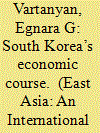| Srl | Item |
| 1 |
ID:
027851


|
|
|
|
|
| Publication |
Cambridge, Cambridge University Press, 1984.
|
| Description |
xvi, 1011p.hbk
|
| Contents |
Vol. VIII: From c. 1940 to c. 1975
|
| Standard Number |
0521224098
|
|
|
|
|
|
|
|
|
|
|
|
Copies: C:1/I:0,R:0,Q:0
Circulation
| Accession# | Call# | Current Location | Status | Policy | Location |
| 028008 | 960/CRO 028008 | Main | On Shelf | General | |
|
|
|
|
| 2 |
ID:
163320


|
|
|
|
|
| Summary/Abstract |
The paper aims to investigate the transformation of South Korean economy from strict state regulation to liberalization and to fill in the gap in the historical analysis of the transition from import-substitution to export-oriented economy of South Korea. The study relies on the methods of comparative-historical, historical-typological, and historical-genetic analysis to consider the evolution of South Korean economic system, the change in economic development model, and the transition to a new economic strategy. The study also implies the use of interdisciplinary methods to systematize the empirical material, applying political-geographic, economic, and complex approaches. The paper gives periodization of South Korean economic development and investigates the reasons of country’s successful modernization and transition to export-oriented economy. Large corporations began to emerge in South Korea in the mid-1960s due to the active support from the state. They established the production of steel, marine vessels, automobiles, and electronic devices. The well thought-out government program brought notable success by the late 1990s, and South Korea gained the developed industrial base and powerful export potential. The afflux of foreign investments and the competitiveness of Korean products were mostly provided by low wages, traditional diligence, and Confucian education. Since the Korean strategy of economic development happened to be successful, there is a need for examining the experience of modernization as it can be useful for developing countries.
|
|
|
|
|
|
|
|
|
|
|
|
|
|
|
|